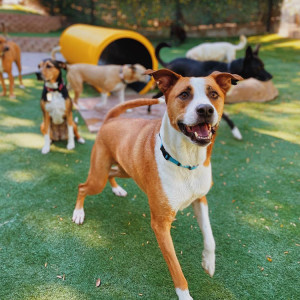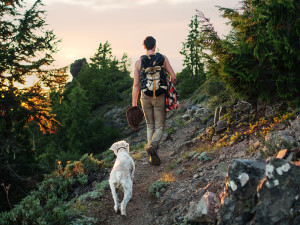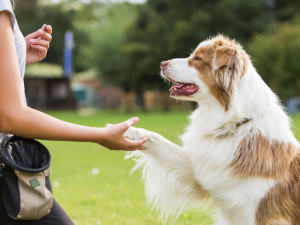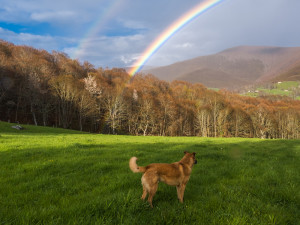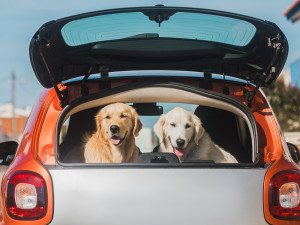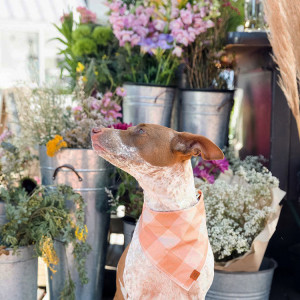How to Start a Dog Camp
Dog Camp 101: What I learned by starting my own dog camp.
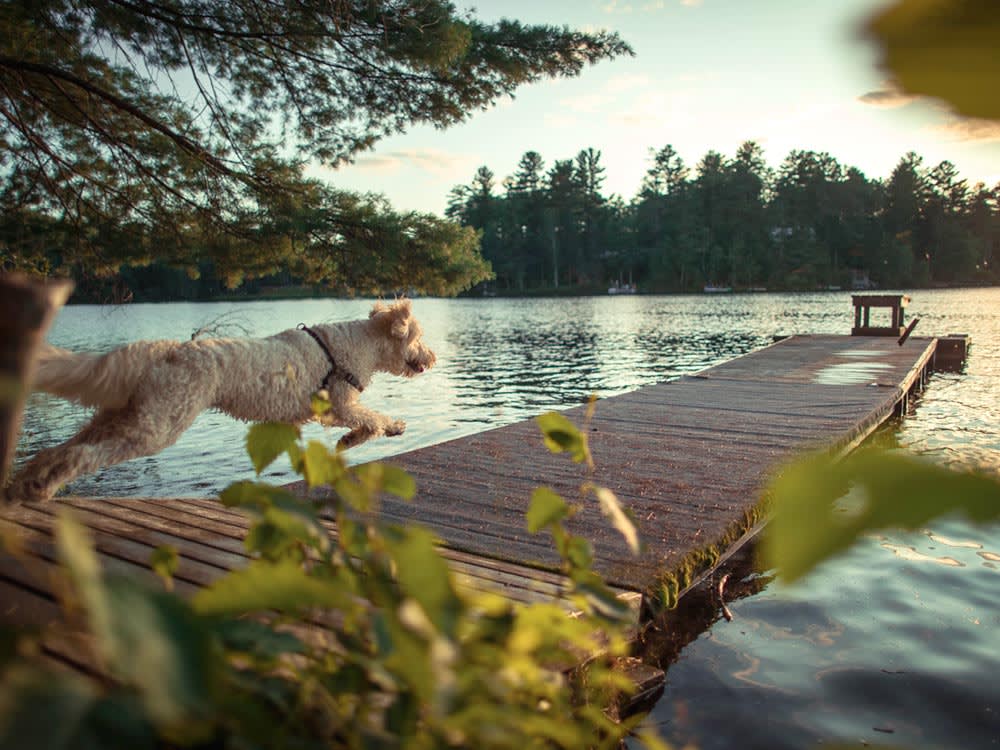
Share Article
Welcome to Dog Camp 101, where the first lesson is: Be prepared for anything … and have a Plan B. Some days I tell myself I’m insane to even consider running a dog camp, what with the time required to attend to the myriad details, the possible financial loss, and the worry that the guests and their dogs won’t have the absolute best time of their lives (if you’re going to worry, worry big). But those days are balanced by the uplifting ones, when I respond to emails and phone calls about camp and get to “talk dogs” with people who are as enamored of their canine companions as I am of mine. My reward is seeing the smiles on the faces of the dogs and their guardians at camp. It’s certainly not the money. Let me share with you some of what I’ve learned along the way.
Why Start a Dog Camp?
The idea germinated for several years after I saw a story on television about Camp Gone to the Dogs in Vermont. If it hadn’t been so far between Vermont and my home in Seattle, I would have signed up for it in a heartbeat. Instead, I decided to wait for someone to start a dog camp near me. I waited some more. Then I started visiting the Flying U Ranchopens in new tab in British Columbia, where dogs are welcomed, which inspired me to begin thinking of starting my own dog camp. In 2002, I decided to take the next step—if I was serious, it was finally time for me to commit to this project. I wanted to experience that sort of fun with my dogs and make it available to others.
As it turns out, my motivations were similar to those of other camp operators with whom I spoke for this article. Honey Loring of Camp Gone to the Dogsopens in new tab, the originator of the dog camp phenomenon, started her camp after attending an obedience seminar that she felt was way too serious and fun-deprived. She wanted to create a happy place for dogs, and has succeeded beyond her wildest dreams. Because the camp, which opened in 1990, was so unique, she received an extraordinary amount of publicity, from coverage on the CBS Sunday Morning show to articles in the Wall Street Journal, dog magazines and even Cosmo, for heaven’s sake. Those of us following in her footsteps can only dream of such free advertising.
Chicago resident Alysa Slay went to camps as a child and worked as a camp counselor herself for many years. Frustrated at the lack of places for her dog to legally roam and play off-leash, Alysa recalls the defining moment—a dream—when she knew she wanted to create a place where people could play outdoors with their dogs. She and her close friend Dave Eisendrath started Camp Dogwoodopens in new tab in 2001.

All of us operating dog camps love our dogs and dogs in general. We created our camps to help people reconnect with their dogs in a natural setting and deepen the bonds they share with their canine companions while having fun.
Learning by Observation
Do your research and identify the best aspects of other projects or small businesses around you before proceeding. For example, I’m a runner. I know several runners who organize trail-racing events, so I volunteered to help out, which gave me a front-row seat from which I observed how these events are put together and carried off. I began to transfer what I learned at these events and what I saw at the dude ranch to a dog camp format. As I researched, I refined what I wanted—dogs off-leash throughout their time at camp; a focus on play, socialization and basic obedience rather than serious competition training; and an experience that was simple and fun. Then I did a gut check: Was I truly willing to invest time and money, perhaps over several years, to make this idea a reality? I imagined my first year, worst-case scenario: invest lots of “free�” time, lose maybe $1,000, walk away and never do it again. I decided I could live with that, and proceeded.
What’s in a Name?
Choose a word or phrase that’s easily spoken and remembered and will also look good in a logo. Many camps have whimsical names: Camp Dogwood and Camp Unleashed are some examples. I ended up combining the names of my own dogs for Maian Meadows Dog Campopens in new tab. I hoped the name would convey the joy of dogs romping through a mountain meadow. When campers hear me calling my dogs, they have an “aha!” moment about the source of the camp’s name, which makes it memorable.
Location, Location, Location
Early on, I received some valuable advice: Choose a location within a two- to three-hour drive of a major city, because after investing that much time in getting to a destination, most people will stay several nights, which makes for less administrative work. (Many camps solve this problem by requiring a minimum stay.)
That may be easier said than done, however. Finding a resort that would allow my guests to stay with dogs off-leash throughout the grounds took perseverance—I swear I heard laughter in the background during some initial phone inquiries. But then I discovered that organizations such as Camp Fire, Boy Scouts, Girl Scouts and various church groups, who frequently sponsor camps (for two-legged campers) themselves, often seek rental income during those times when their camps are not in use. Eventually—again, through a web search—I found a Camp Fire facility in the woods on a lake roughly two hours from Seattle. They didn’t laugh at my idea, and in fact, bent over backward to ensure it worked so that I could rent their camp years into the future, thus providing them with a tidy and reliable bit of extra income.
This particular camp is rustic, sure, but that’s a large part of its charm, and allows us all to stop worrying about the dogs damaging things. It has a large building with kitchen, and an open-air dining hall where the dogs are allowed, which is one of the features guests love—they don’t have to leave their dogs in their cabins at mealtime.
I negotiated the terms of my rental agreement, which included lifting a restriction on alcohol; allowing at least the dogs to swim without a lifeguard; and, most importantly, a last-minute cancellation clause that got me off the hook if I didn’t get enough guests to cover the minimum per diem. Developing a good working relationship with the Camp Fire organization has been the backbone of my camp’s success. (If you’re not comfortable undertaking these negotiations yourself, seek the help of an attorney.)
Liability and Insurance
Though running a dog camp is in many ways a labor of love, there are still real-world business concerns to be taken into account. Do your homework, study the financial and legal risks, and seek advice from a CPA and/or business attorney as to the best business format for you and your goals. You can’t anticipate every problem, but you can minimize your exposure.
For example, any activity involving dogs risks litigation inspired by bites, fights or injuries. I found an insurance policy offered to dog trainers that costs $350 per year and covers all of my training activities during that interval, including those at camp. Expensive for a couple of weekends, perhaps, but reassuring to have and required by the facility I rent. Reading the insurance policy was another gut check—was I willing to risk being sued? I decided the risk was small, and with the protections, I had in place, not something that would keep me awake at night.
Marketing a Dog Camp
As a lawyer, I’ve never had to do any marketing, so for my dog camp, I once again relied on friends. A friend designed my website. Another accepted $50 for the “fun little project” of creating a flier promoting the camp. A dog trainer friend, provided her client list. I needed a logo, and got lucky when I found a graphic design student who did an excellent job. I can’t emphasize enough how key my friends have been to the success of my camp. Don’t be afraid to ask for help.
Some of my initial attempts at marketing were clumsy. I mailed roughly 100 fliers that first year, but later found that all of my guests learned about camp through postings at local off-leash parks or by talking to me when I encountered them and their dogs in local parks. The next year, I skipped the fliers and mailings and saved myself significant money and effort. Instead, I designed postcards with an eye-catching photos of dogs romping on the camp beach, and handed them out at parks and expos. If you aren’t already web-savvy and able to create cards and fliers yourself, learn (or be willing to hire someone to do it for you).
One key marketing factor was providing my phone number; people felt better about signing up after talking directly to me. Another was networking with other dog-oriented businesses in my area. Most were happy to do so, as it’s a very supportive community. These exchanges allowed my website to eventually show up on Google for “dog camp near me,” which brought new potential campers. Try to use such free and creative avenues to market your own camp.
“The Food Here Is Awesome!”
Good food for the human campers is critical! I wanted camp food to be plentiful, tasty and served family-style so campers could get to know one another at mealtime. (Canine campers’ meals come with them from home; imagine the consequences of lots of dogs eating unfamiliar food!)
Luck smiled on me early in this regard. Sitting in court one morning, I chatted with an attorney I’ve worked with for years. Impulsively, I told her about my dog camp idea and mentioned that my most difficult task would be providing food. She quite breezily said, “I like to cook for groups; maybe I could do it.” I gave her a look of shock and surprise (remember—I hate to cook), but she insisted that it would be fun for her to do the cooking because she loved trying out new recipes on large groups. She refused to accept payment, or even a public thank-you for her efforts; she’s quirky that way, and I accepted her terms. Who wouldn’t? The food was delicious and plentiful. A special touch was a fresh peach cobbler-and-ice cream dessert served to guests as they sat around the evening campfire.
To reduce dishwashing to a minimum, we used paper plates and plastic utensils. If my good relationship with the managers of the camp facility is the backbone of my operation, the food is its heart and soul.
Other camp operators use food services provided by the facility they rent, and hiring a caterer is another option. But we all agree that the success of a camp can hinge on the quality of the food, so don’t cut corners on this part of the operation.
Friends as Volunteer Staff: The Good, the Bad, and the Puzzling
Utilizing a paid staff eliminates hurt feelings or misunderstandings but generates additional paperwork and tax obligations. Every new camp operator has to decide how best to address this issue. Much will depend on your budget; I’m able to keep the cost of my camp low because so many people are willing to volunteer their time to help me run it. Cultivate your friends.
However, I have some advice on this subject: Before accepting a friend’s offer to help, ask yourself whether—given a worst-case scenario—you can stand to lose that person’s friendship. If the answer is yes, proceed carefully, and discuss what you expect and what you’re willing and able to provide in return (such as free room and board during camp). If the answer is no, find someone else for the job, hire help or (more likely) do it yourself. The reality is that this new aspect of your relationship could ultimately stress the bonds of friendship to the breaking point.
Welcoming Guests to Camp—First Impressions
Be sure your guests feel welcome from the start. Make a good first impression so that they can relax and enjoy themselves. My participation in trail-running events taught me that a welcoming “goodie bag” is a great way to greet guests. My artistic and creative sister-in-law made various craft gifts as well as prizes for games and contests. The gifts and prizes were a hit and created a good initial vibe as well as word-of-mouth promotion for little expense.
My goodie bags also contain a list of camp rules, a schedule of meals and events, and fliers for the various dog-related businesses I agreed to promote in exchange for links to my camp from their websites.
A Pleasant Exhaustion
If you approach starting a dog camp with the right attitude, you can’t help but be successful as you enrich the lives others as well as your own.
Every camp operator I talked with agreed that the people and dogs you meet and befriend at camp make all of the effort worthwhile. “I have a whole new group of friends,” said Alysa, who uses vacation time from her job as a psychologist to run her camps. I’m self-employed and can work around my own camp’s schedule. Honey is lucky enough to make a living from her camps and other dog-related businesses, but every other camp operator I know gives this advice: Don’t give up your day job! For most of us, this is, in reality, a hobby business. In many ways, that frees us to do it because we’re passionate about the camp and about dogs, not because we have to pay the bills.
Camp is a sort of “alternative universe,” where for a few days, people can recharge their spirits and experience the unconditional love of dogs by being in the moment with them. If camp can provide that, it’s worthwhile. But to disabuse anyone of the notion that being a camp director is somehow glamorous, keep in mind that one of our last duties before closing down the facility is scooping poop.
After being “on” for the entire camp session, which of course follows weeks of anxiety leading up to it, I’m totally exhausted for days afterward, as are my two dogs. One of my campers told me that her Jack Russell slept all the way home, the first time in his life he’d slept in the car. To me, that was the highest praise—as I’ve always said, a tired dog is a happy dog. By the end of camp, I, too, am tired and happy. Even when I lost money my first year, I told myself I had just thrown a great party for a group of my newest friends. Indeed, when all those campers returned the next year (with the exception of one who moved to South Dakota), it was a wonderful reunion with people I now consider to be dear friends.

Rebecca Wallick, J.D.
Rebecca Wallick, was long-time contributing editor for The Bark magazine and retired family law attorney, she lives with two dogs and runs mountain trails at every opportunity.
Related articles
![Josh and Snow next to each other]()
Chasing Rainbows with Josh & Snow
Meet LA’s most in-demand hair colorist. Sorry, he only sees canine clients — like Cardi B’s dog.
![Two golden retrievers, white and gold, traveling together at the back of the small compact silver and orange car. Sitting in the trunk, looking outside through the opened window.]()
Follow These Road Trip Tips for Wanderlusting Pet Parents
Bring your pet along for the ride with these pro tips from a dog trainer.
![Tan and white dog wearing a bandana in from of a flower stand]()
The Foggy Dog Takes a Sunny Approach to Sustainability
Founder Rose Shattuck on her thoughtfully designed pet essentials and accessories — made locally and sustainably.
![A dog on a kayak in Austin, Texas with a view of the city in the background.]()
How to Visit Dog-Friendly Austin with Your Pup
Ten reasons why you should visit this pet-friendly southern city.
